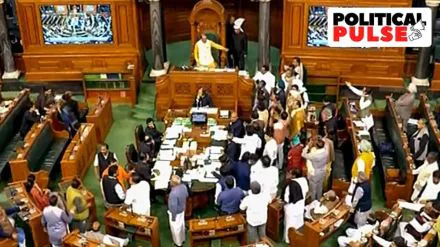
The ongoing tussle between the BJP-led NDA government and the opposition over the election of the Lok Sabha Deputy Speaker is a significant political development. The question remains whether this conflict will escalate or if a consensus formula will emerge.
Following heavy rainfall in Delhi last Thursday and Friday, the capital celebrated India's historic victory in the T20 World Cup on Saturday. Prime Minister Narendra Modi promptly congratulated the team, and Lok Sabha Speaker Om Birla was seen receiving congratulations from numerous well-wishers at his residence. Modi's popular radio program 'Mann Ki Baat' resumed on Sunday after a hiatus due to the election code of conduct.
Monday marked the resumption of the 18th Lok Sabha's first session and Rajya Sabha meetings. The Lok Sabha's commencement was marred by disagreements. The NDA sought the opposition's support for Om Birla as Speaker to maintain the tradition of unanimous election. However, the opposition fielded Congress MP Kodikunnil Suresh as their candidate. Eventually, Om Birla was elected Speaker by voice vote.
The opposition, citing parliamentary tradition, demanded the Deputy Speaker position, prompting them to field a candidate against Birla. The Speaker plays a crucial role in maintaining order and interpreting parliamentary rules, especially during disputes and anti-defection law enforcement.
All eyes are now on the Deputy Speaker election. Congress insists on the Deputy Speaker position, while NDA allies like TDP and JD(U) have internal pressures regarding this post. However, it remains undecided when the Deputy Speaker election will take place.
The 17th Lok Sabha left the Deputy Speaker position vacant for its entire term, an unprecedented occurrence in India's parliamentary history. According to the Constitution, both the Speaker and Deputy Speaker must be elected. The Deputy Speaker assumes the Speaker's responsibilities in their absence.
Political analysts believe the NDA remains steadfast in not conceding the Deputy Speaker post to the opposition. Modi's call for consensus and parliamentary debate signals a healthy democracy, but it requires practical implementation.
Defense Minister Rajnath Singh, acting as a key negotiator for the Modi 3.0 government, engaged with opposition leaders regarding the Speaker election and is now discussing the Deputy Speaker post. These talks indicate that the central government seeks input from the opposition on significant decisions, a practice that should continue.
West Bengal Chief Minister Mamata Banerjee suggested that an MP from Ayodhya be made Deputy Speaker, highlighting the political complexities surrounding this election.
The start of the 18th Lok Sabha suggests intense debates and disagreements between the government and opposition. Given the BJP's coalition government, this session is expected to witness more attempts at consensus-building than seen in the previous two Lok Sabhas.
As the Lok Sabha Deputy Speaker election approaches, it will be crucial to see how far the NDA-opposition conflict escalates or if a consensus is reached.